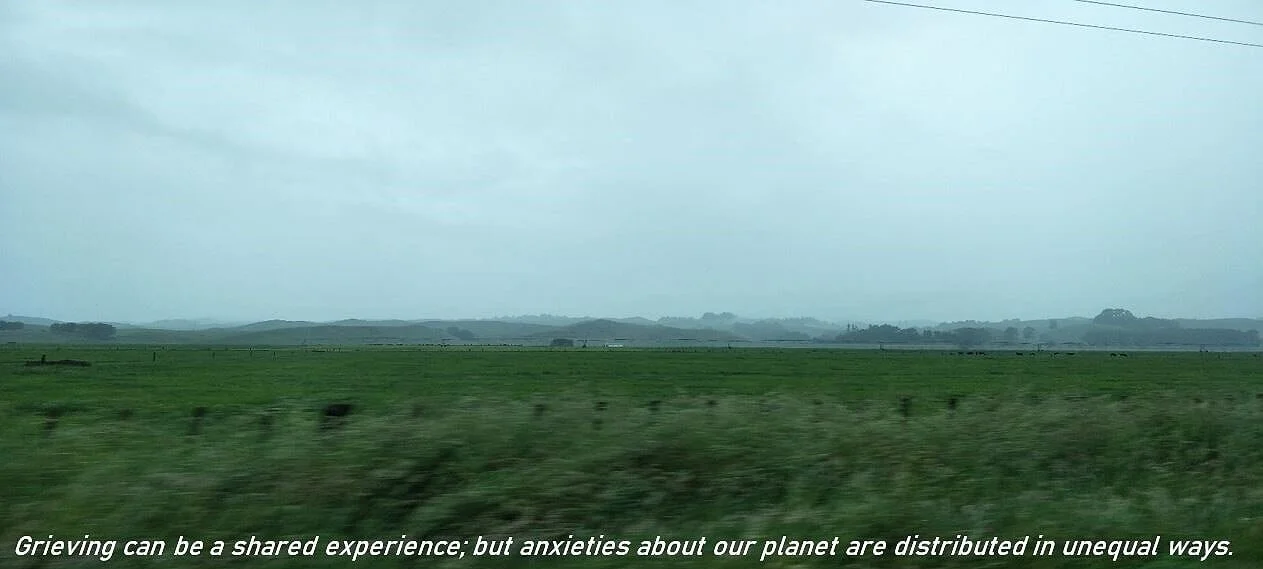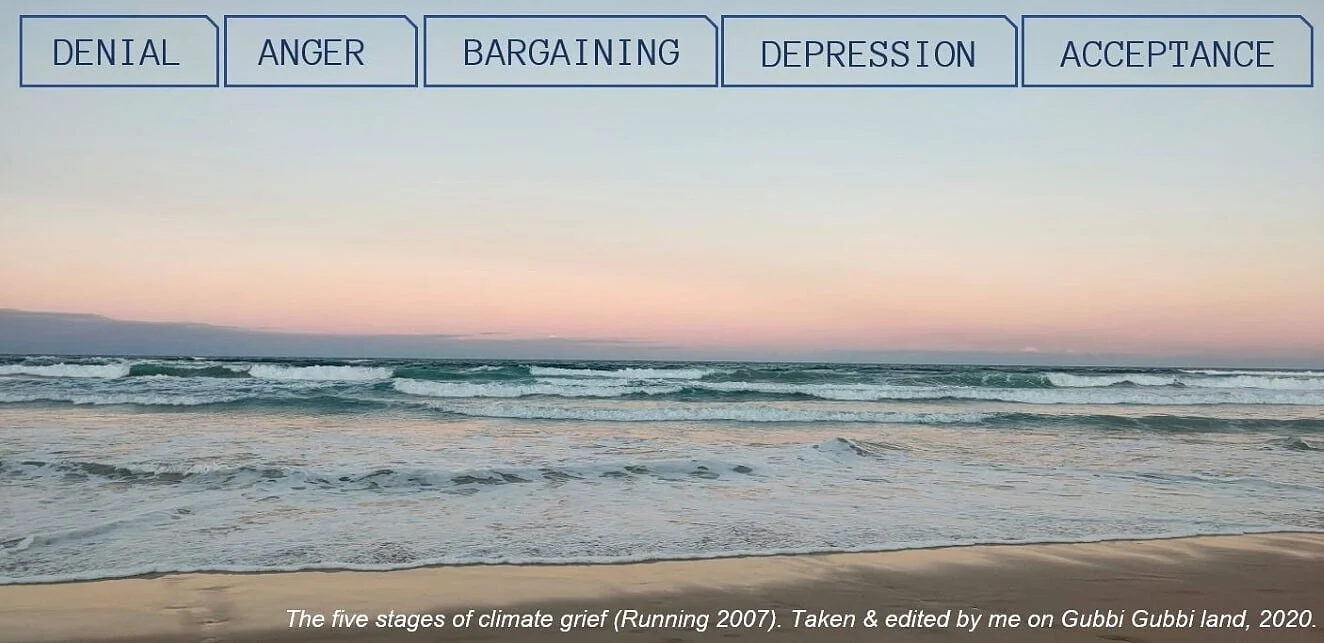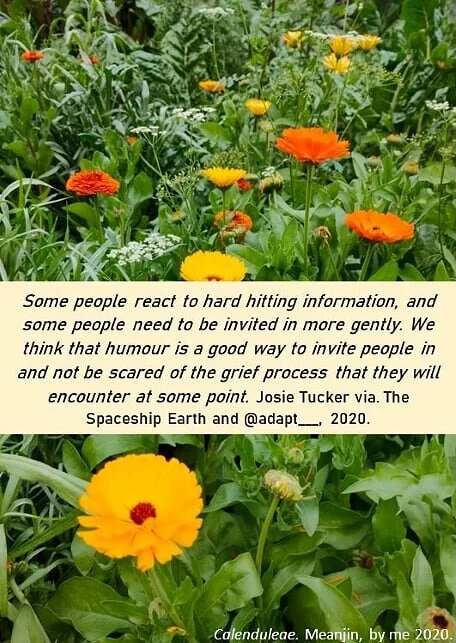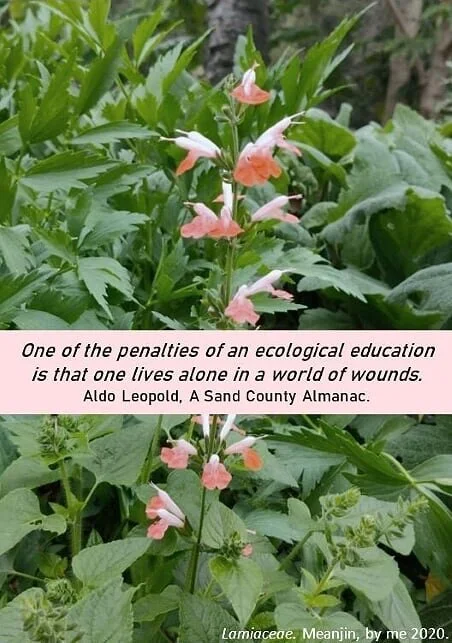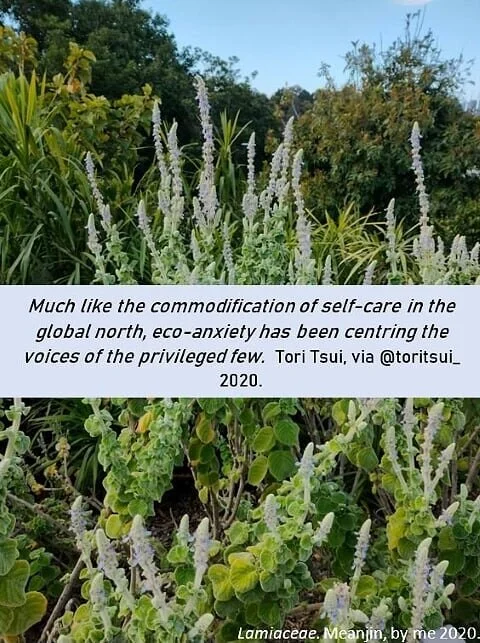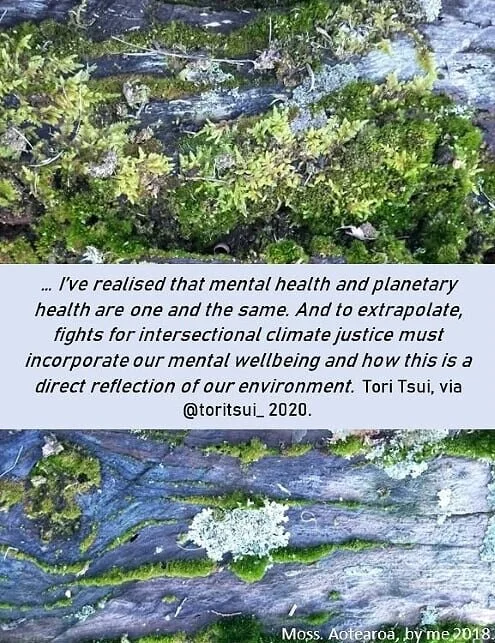By Bridget Gibbs, MSc. (she/her)
CW: anxiety; climate change; depression; grief; race; white privilege.
I acknowledge that I am working, living, and benefitting from Meanjin land (occupied Brisbane). Sovereignty over this invaded land has never been ceded by the Yuggera and Turrbal people, whose rights and abilities to self-govern are yet to be acknowledged. I may refer specifically to First Nations/Blak people (ie. Aboriginal and/or Torres Strait Islander peoples); Black people (mainly referring to Black Americans); BIPOC (Black, Indigenous, and People of Colour); WoC (Women of Colour); or to white people (ie. Anglo-Australians). I am a white person so ‘we’, ‘our’ and ‘ours’ will henceforth refer collectively to other white people and I. I am not a mental health professional; my recommendations and my opinions are my own in dealing with depressive and anxious symptoms.
Have you ever felt sadness, anger or despair when hearing environmental news? Do you feel hopeless and uncertain in the face of coral bleaching events; mass species extinctions; deforestation; bushfires; or other changes that we and future generations must combat? (Image & text by me. Aotearoa, 2019).
[Alt Text: a landscape photo of green fields and grass, mountains in the distance, and a blue sky. Text on image: Grieving can be a shared experience; but anxieties about our planet are distributed in unequal ways.]
Working from home has some perks. Being able to skip away from my home (on rare days where I manage my time properly), to walk around the Mount Coot-tha Botanic Gardens is one of those perks. When I walk around the gardens, picturing myself in some sort of fairy land, I pass by children, Blue-faced Honeyeaters, Lorikeets, and many more plant species than I could ever name. I wonder if any of this will be here by the time our country has had its next seven Prime Ministers (that’s ten years by regular timescale).
I will not repeat the facts, the statistics, or the scare-tactics around climate change, as these forms of data (exacerbated by biased news media) contribute to our sense of helplessness. Many of us are well-informed about current trends and future climate scenarios, but do not have the mental capacity or energy to deal with them. I am not ashamed to admit how often I switch off when I hear anything related to the environment, because sometimes it is all just too much. I turn off the radio and I flick past any content online when anxiety-generating words arise. I am sure many others do the same, and I think it is because we are sitting in one of the stages of climate grief. The discussion around climate grief, however, seems to be largely dominated by whiteness, and in order to move forward we must work to decentre white feelings and privilege.
What is Climate Grief? Is it a Mental Health Condition?
Reminder: climate change is the long-term change of temperature and typical weather patterns.
Dominant causes of climate change are human activities such as burning fossil fuels (natural gas, oil, and coal), which release greenhouse gases (GHGs) into the atmosphere. GHGs trap heat from the sun, and cause the Earth’s average temperature to rise. This creates flow-on effects such as sea warming and rise; flooding; melting glaciers; species decline; changes to weather and more (National Geographic Society, 2020). This may directly or indirectly lead to the loss of livelihoods and cultures, and our sense of place and belonging.
Climate grief is similar to eco-anxiety; existential dread; and ecological grief or mourning about a changing climate. It can feel like;
Grief associated with physical ecological losses and attendant ways of life and culture;
Grief associated with disruptions to environmental knowledge systems and resulting feelings of loss of identity;
Grief associated with anticipated future losses of place, land, species, and culture (Cunsolo & Ellis 2018, p. 276-277; Bryant 2019).
Climate grief builds on our understanding of ecological grief, where we may experience or anticipate the loss of species, ecosystems, and landscapes due to environmental or climate change (Cunsolo & Ellis, 2018). Yet, climate grief also encompasses losses associated with culture, lifestyle, and livelihood which is more than just the loss and destruction of species. This might also involve a range of timeframes, i.e. slow-moving and fast-moving effects.
Feelings of “…fear, anger, guilt, shame, grief, loss, helplessness” around climate change are recognised by the Australian Psychological Association (2020), however, I have not been able to locate ‘climate grief’ formally listed as a mental health condition, illness, or disease. I tend to refer to climate grief as a condition, as I feel like it helps me to legitimise my feelings. This condition, however, “…is often categorised as a form of disenfranchised grief which means it isn't always publicly or openly acknowledged” (Cockburn 2020). The issue with not having a legitimate, definable set of feelings listed as ‘climate grief’, or a database to turn to, is that it may be harder for sufferers to identify and treat it.
It may not be abundantly clear how climate grief could be similar to dealing with the loss of a person, but we may experience a number of similar reactions. The five stages of grief model, as first defined by Elisabeth Kübler-Ross (1969) and later by Stephen W. Running (2007), can be ascribed to our feelings of despair and loss for our changing environment. There are limitations to this model however, as stages may not present themselves in a linear fashion but could jump back and forth, or you may feel many at once.
[Alt text: An image of a beach with white-capped waves crashing, at sunset - pink to orange to yellow to blue. Text on image: Denial, anger, bargaining, depression, acceptance. The five stages of climate grief (Running 2007). Taken and edited by me on Gubbi Gubbi land, 2020.]
Climate Denial
Generally, when you are in the denial stage you are refusing to believe scientific data or evidence of climate change. Denial also comes from not believing that humans (anthropogenic activity) are the cause of climate change, and a common misunderstanding is that our current patterns of climate cooling and warming are naturally occurring.
Denying that we, individually, can accept some responsibility seems to be another common problem. I have seen a lot of discussion around capitalist responsibility versus individual, (i.e. companies that emit the most emissions or create the most disturbance to ecosystems should be the ones responsible). This is a fair statement to make, however, we all contribute to a capitalist system that will not change unless our own behaviours do. Shifting the blame onto other, far away companies and brands might temporarily make ourselves feel better about our inaction, but in the long-term this is a dangerous view to have. For those of us who have not lost our local ecosystems, our livelihoods or our loved ones to the worst impacts of a changing climate, have the privilege to deny scientific evidence and to deny individual responsibility.
+ Distance
I will also include here the concept of distance as a way of denying climate change. When studying the environment and discussing the topic with others, I have often felt a feeling of distance. Distance can be thought of in the literal sense, that there is physical space between us, the most privileged few, and the worst occurring climate disasters (although recent bushfires have surely reinforced the closeness of the situation). I also gather a sense of distance in terms of us having time left to avert the worst impacts. Individuals tend to claim there is no time left to halt the worst effects, and so deny that they have a responsibility to act.
Climate Anger
Perhaps we are furious about the state of the planet and we do not know where to redirect this energy. Anger is an appropriate response, but we need to work ourselves out of the frustration stage and away from dwelling on who is to blame. Those in the anger stage may accept the reality of climate change, but are angered by the thought of altering their behaviours. Shifting the blame and the responsibility onto others can also emerge from an anger-focused response.
Climate Bargaining
Those in the bargaining stage participate in wishful thinking, or they may try to look for positive impacts of climate change. To bargain is to make ourselves feel better (albeit temporarily), about future or current climate scenarios. An example of this may be a saving in money due to a reduction in household heating usage in extremely cold climates, which is the result of global temperature rise. I do not think that any truly positive impacts of climate change exist, not, at least, without adverse reactions occurring in other parts of the world. Bargaining is only possible for those people in positions of privilege. Privileged individuals are those who are able to avoid the worst impacts of a changing climate, or are able to avoid radically changing their behaviours. This is always at the expense of others, who do not have the time or resources to avoid or delay the impacts.
When we notice ourselves in this bargaining-phase, it is worth asking whether we are bargaining for our own peace of mind at the expense of more vulnerable, marginalized, and “invisible” groups who will face climate losses more drastically, and with fewer resources. (Bryant 2019).
Climate Depression
For many of us, studying and working on the environment is deeply tied to who we are and what we believe in. Accepting the reality and the overwhelming enormity of the situation can make us feel so helpless and sad. I frequently find myself in this stage and I often dread any conversation about the environment.
A person suffering from climate depression may feel too hopeless about the future to reach out to others, join groups, or become involved in any kind of climate activism. This reaction can be common among climate scientists and activists. Even if they remain involved, they may neglect self-care, over-commit to the cause, and potentially burn out. (Bryant 2019).
I find that the best way to cope with this stage is to do the very opposite of what I want to do. For example, ‘I really do not want to talk or think about climate change because it is too depressing’, becomes ‘I must reach out to people who can validate my feelings and discuss them with me, and this reminds me that I am not alone’.
Climate Acceptance
[Alt text: Blooming orange and yellow flowers (Calenduleae) in a green field. Text on image: Some people react to hard hitting information, and some people need to be invited in more gently. We think that humour is a good way to invite people in and not be scared of the grief process that they will encounter at some point. Quote from Josie Tucker via The Spaceship Earth and @adapt_____, 2020.]
It is hard to describe and deal with symptoms that seemingly do not have a name or cause. Working through and acknowledging our depressive or anxious symptoms will hopefully lead to accepting the situation for what it is. Actively accepting that we are experiencing: anger, grief and loss; changes to our environments, lives and lifestyles; and uncertainty for our futures, will assist us in moving towards action. Acceptance allows us to fully participate in climate action. As Victoria McGeer suggests, “If you’re feeling hopeless about climate change, get involved with people who are actively involved in doing things” (McGeer via Ortiz 2020). There are inevitable losses that will continue to occur globally, but we also must hold onto hope rather than optimism, as “…hope is a deeply social phenomenon” which involves “empowering ourselves in part through empowering others…” (McGeer via Ortiz 2020).
Stoknes argues we should settle our hope in our values – in what we believe is right and needed. Our actions can’t be based on the expectations of a happy ending. That outcome is outside of our control. If emissions keep rising, we risk deflation and action can dry up. Our values, however, persist. This view of grounded hope embraces the unknowns and accepts uncertainty as the natural habitat of hope. “You’re no longer dependent or addicted to optimism,” says Stoknes. “You can be pessimistic and yet full of hope” (Ortiz writes of Per Espen Stoknes, a Norwegian psychologist, 2020).
An Intersectional View is Key
[Alt text: A stem of pink flowers (Lamiaceae), against a backdrop of spikier greenery. Text on image: One of the penalties of an ecological education is that one lives alone in a world of wounds. Quote from Aldo Leopold, A Sand County Almanac. Meanjin, by me, 2020.]
Currently, we are fighting a pandemic, political and socio-cultural warfare, and economic collapse. We are protesting for the most basic human rights to live equally, regardless of race and gender. Amongst all of this, environmental news can be pushed to the sidelines, and events such as more severe and frequent flooding across Bangladesh and India (with approximately 1,000 deaths); a potentially extremely damaging oil spill in Mauritius; and a powerful derecho (storm) in Iowa (USA), lack the attention that they deserve. These events are equally horrific, yet there are inequalities in the ways that we perceive these events and in how we deal with the feelings of loss associated with them.
Grieving can be a shared experience, but anxieties about our planet are distributed in unequal ways. I realise that when I think about this topic, I often centre myself, and my whiteness. My lived experience of climate change and climate grief is not really comparable to those communities and individuals who must deal with intersecting racial, social, and environmental injustices. An example of this is the unequal distribution of air pollution exposure in the USA, where Black people and Hispanic people “…on average bear a “pollution burden” of 56% and 63% excess exposure, respectively, relative to the exposure caused by their consumption” (Tessum et al. 2019, p. 6001). This is compared to non-Hispanic white people, who experience “…∼17% less air pollution exposure than is caused by their consumption” (Tessum et al. 2019, p. 6001). In this case, if our goal is to reduce the levels of air pollution and subsequent health complications that Black and Hispanic people experience, we must also consider the socioeconomic, racial, and political barriers that have created this situation.
It’s no accident that the map of climate change’s worst wrath to date looks like a colonizer’s playground. Because that’s what it is. And it’s also no accident that when it does play out in more “affluent” countries, it finds its way to communities of color with all the precision of a heat-seeking missile — that’s a feature, not a bug. (Heglar 2019).
[Alt text: Purple flowers (Lamiaceae) growing in a field with trees and blue sky in the background. Text on image: Much like the commodification of self-care in the global north, eco-anxiety has been centring the voices of the privileged few. Quote from Tori Tsui, via @toritsui_, 2020. Meanjin, by me, 2020.]
Efforts to reduce the impacts of climate change must be intersectional and inclusive, as environmental racism can be exacerbated when we attempt to make change. We must also include an understanding of class and ability issues, because asking people to switch over to eco-friendlier products and practices is not realistic for those with no disposable income. Just as asking people to only take the bus might not be an option for people who have a mental or physical disability.
Moving Forward
Rather than throwing away this year and wishing to forget all that has happened, we should hold onto the anger and the sadness and make it our mission to do better. We must rest and recuperate when we are at our most overwhelmed, but we all have a duty to work out how to push through the denial, the anger, and the despair, so that we may slow down the catastrophes that have been handed to us. We have the opportunity to grieve together and to heal together (a nice example of this is the coming together of Aboriginal and non-Aboriginal people to sing in the local Darug Aboriginal language and discuss their feelings of loss, at Deerubin, Hawkesbury River, VIC, read about it here). Accepting, acknowledging, adjusting, and rediverting thoughts and energy into more positive actions and outlets is our way forward. So whatever you do, make sure you are doing something as “…inaction is a political statement” (Barks 2020).
Some reminders:
1. Take time to rest, recover, and recuperate;
2. Focus on small wins and positive environmental news stories (they are out there – we are purposely lead to believe it is all doom and gloom, check out HappyEcoNews);
3. Take note of words, sentences, or concepts that are particularly upsetting for you (i.e. land clearing, bushfires, ice melt, temperature rise, sea level rise); acknowledge how they specifically make you feel (i.e. anxious, sad, uneasy, angry); and note where this information is coming from (i.e. a particular news channel, Facebook page, M*rdoch Media). If the upsetting information tends to come from a particular source often and it makes you feel defeated, you could unfollow these sources.
[Alt text: Green moss growing on a grey-blue tree. Text on image: …I’ve realised that mental health and planetary health are one and the same. And to extrapolate, fights for intersectional climate justice must incorporate our mental wellbeing and how this is a direct reflection of our environment. Quote from Tori Tsui, via @toritsui_, 2020. Aotearoa, by me, 2018.]
4. Tell your friends, your parents, your cat, when you are stressed about the state of the planet and be mindful of burnout in yourself and others (lacking motivation, feeling tired and exhausted, not wanting to participate);
5. Make ‘greener’ choices:
o Avoid buying produce wrapped in plastic, and re-use any green plastic produce bags you already have;
o Use recycled toilet paper (available at major supermarkets or Who Gives A Crap);
o If you are able, take the bus rather than driving whenever possible;
o Drink loose-leaf tea in place of tea bags;
o Try bamboo alternative pads, or a menstrual cup;
o Cut the bottoms off your old baggy jeans rather than buying those new shorts;
o Consider where your clothing items are produced and what materials they are made of (#Boycot Boohoo);
o Replace one meat-dominated meal per day with a vegetarian one;
o Do some research into environmental racism and intersectional environmentalism;
o Sign and share petitions, participate in protests, ask what your local MP’s are doing for your area, or donate within your means (e.g. WWF, ACF, Climate Council, Sea Shephard, or to social causes like Refugee Solidarity Meanjin);
o Focus on using up what you have rather than purchasing greener replacement products.
If you are struggling or would like to receive professional help for feelings of climate grief, depression, or anxiety, I would recommend contacting Lifeline (13 11 14), or Beyond Blue (1300 22 4636). If you would like to discuss anything mentioned here please do not hesitate to send me a message at b.gibbs@onewomanproject.org, or connect with the wonderful OWP Team on Facebook and Instagram (‘One Woman Project’).
References & Reading List
Australian Psychological Society 2020, ‘Coping with climate change distress’, APS, https://www.psychology.org.au/for-the-public/Psychology-topics/Climate-change-psychology/Coping-with-climate-change-distress
Barks, P 2020, ‘Why is inaction a political statement?’, @polly.barks via. Instagram. https://www.instagram.com/p/CECRYnmHFoY/
Bryant, A 2019, ‘What is Climate Grief?’, Climate & Mind, http://www.climateandmind.org/what-is-climate-grief
Carson, R, 1962. Silent Spring. Houghton Mifflin Harcourt; Boston.
Cockburn, P 2020, ‘Climate grief expected to be widespread soon but it's still not openly acknowledged’, ABC News, https://www.abc.net.au/news/science/2020-08-19/the-danger-of-climate-grief-lies-in-the-fact-its-often-ignored/12563930
Cunsolo, A & Ellis, NR 2018, ‘Ecological grief as a mental health response to climate change-related loss’, Nature Climate Change, vol. 8, no. 4.
Freedman, A 2019, ‘The unequal burden of air pollution’, AXIOS, https://www.axios.com/unequal-burden-air-pollution-f63247e2-d88a-425e-a7b0-d6439cbff209.html
Frederick, R 2018, ‘The Environment That Racism Built’, Center for American Progress, https://www.americanprogress.org/issues/race/news/2018/05/10/450703/environment-racism-built/
Gillam, C & Charles, A 2019, ‘Community wellbeing: The impacts of inequality, racism and environment on a Brazilian coastal slum’, World Development Perspectives, vol. 13, no. 1, pp.18-24.
Heglar, MA 2019, ‘The fight for climate justice requires a new narrative’, Inverse, https://www.inverse.com/culture/58632-mary-annaise-heglar
Kenyon, G 2020, ‘Australia’s solution to “ecological grief”’, BBC Travel, http://www.bbc.com/travel/story/20200617-australias-solution-to-ecological-grief
Kübler-Ross, E 1969, On Death and Dying. Routledge. https://hbr.org/2020/03/that-discomfort-youre-feeling-is-grief
Leopold, A, 1949, A Sand County Almanac, Oxford University Press.
Mazur, L 2019, ‘Despairing about the Climate Crisis? Read This’, Earth Island Journal, https://www.earthisland.org/journal/index.php/articles/entry/despairing-about-climate-crisis/
National Geographic Society, 2020, ‘Climate Change’, Resource Library, https://www.nationalgeographic.org/encyclopedia/climate-change/
Ortiz, DA 2020, ‘Is it wrong to be hopeful about climate change?’, BBC FUTURE, https://www.bbc.com/future/article/20200109-is-it-wrong-to-be-hopeful-about-climate-change
Pihkala, P 2020, ‘Climate grief: How we mourn a changing planet’, BBC FUTURE, https://www.bbc.com/future/article/20200402-climate-grief-mourning-loss-due-to-climate-change
Running, SW 2007. The 5 stages of climate grief. Numerical Terradynamic Simulation Group, University of Montana.
Tessum, CW, Apte, JS, Goodkind, AL, Muller, NZ, Mullins, KA, Paolella, DA, Polasky, S, Springer, NP, Thakrar, SK, Marshall, JD & Hill, JD 2019, ‘Inequity in consumption of goods and services adds to racial–ethnic disparities in air pollution exposure’, PNAS, vol. 116, no. 13.
Thomas, L 2020, ‘How to be an intersectional environmentalist’, The Good Trade, https://www.thegoodtrade.com/features/practicing-intersectional-environmental-justice
Tori, T 2020, ‘Eco-anxiety’, @toritsui_ via Instagram. https://www.instagram.com/p/CD3cMvgHMgC/
Tucker, J, Ashton, R & Burgess, D 2020, ‘Adapt Climate Club – Laughing our way into action’, The Spaceship Earth, https://www.thespaceship.earth/podcast/2020/8/7/episode-37-josie-tucker-amp-richard-ashton-adapt-climate-club-laughing-our-way-into-action
Vince, G 2020, ‘How scientists are coping with ‘ecological grief’, The Guardian, https://www.theguardian.com/science/2020/jan/12/how-scientists-are-coping-with-environmental-grief


